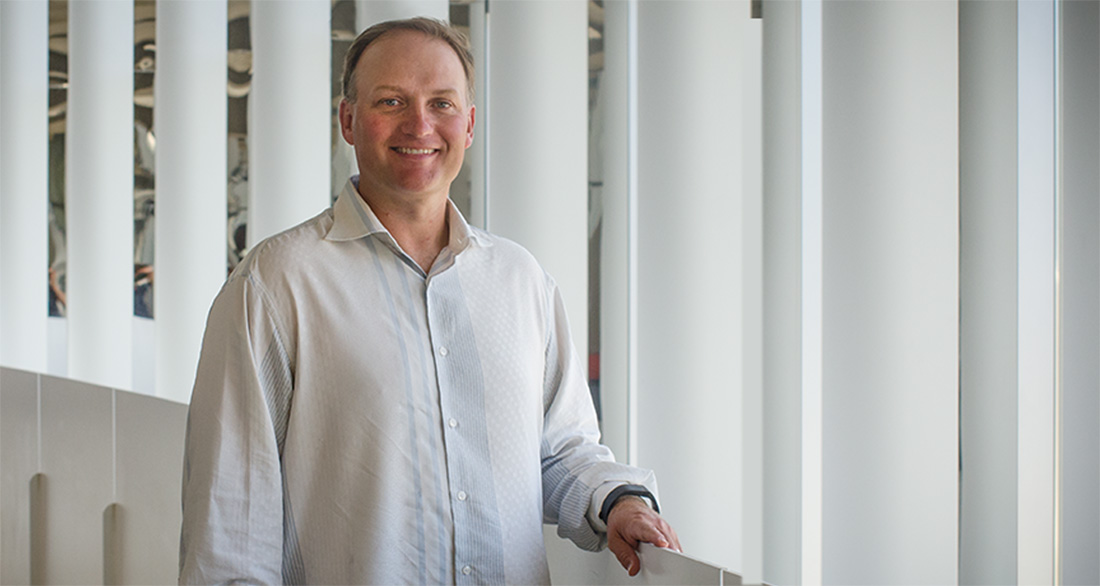Stories about experiences are the way that a lot of Mark Vagle’s work gets done: listening to others’ stories, and telling one’s own. Vagle (pronounced VAHG-lee) is an associate professor of elementary education who works with teachers and doctoral students. He knows that every classroom, from kindergarten to college, is full of stories told and untold.
Vagle is interested in phenomenology, a philosophy and research methodology that focuses on how people experience the world they live in. Stories allow people to describe and share their experiences of any number of phenomena.
The main phenomenon Vagle studies is social class. Class can be described as the way society is divided by social and economic status and assumptions about what is “normal.” Class relies on visible and invisible differences, from skin color to speech, to implicitly and explicitly assign rank or hierarchies within and across groups.
“When we are climbing a social-class ladder, we’re often trying to shed or conceal the rung beneath,” he says.
Vagle emphasizes that telling stories about phenomena such as social class and other markers of difference—including race, gender, and sexuality—should be situated in the contexts in which the experiences take place.
“Given the deep racial struggles in society, and given that, in the U.S., class is arguably always already bound up with race, it is especially important for any examination of social class to be equally focused on race,” he explains.
Changing classrooms
Vagle is a cofounder of the CLASSroom Project, which aims to end the harmful effects of classism in schools. The project developed five principles to guide participants’ work (see box below).
The principles can never really be mastered, Vagle adds. For example, one hierarchy may be disrupted while invoking another. And the aim is not for schools to turn the principles into a checklist. Instead it’s a set of ongoing commitments and mindsets that can be applied to any number of practices and policies.
The CLASSroom Project includes many initiatives. One is a one-day workshop Vagle leads called The Other Side of Poverty in Schools, in which most participants come from K–12 schools. Another is an undergraduate course for students preparing to become elementary school teachers. Another component is writing and publishing.
There is also outreach to schools, in which Vagle and his team are invited to work in schools using a sustained professional development model.
“We have seen, over time, how teachers begin to plan, honor, and draw upon a wider range of student background knowledge,” says Vagle. “Language starts to change.”
Gaining awareness of class
Vagle grew up in northwestern Minnesota as a privileged white male in one of the poorest counties in the state. But he didn’t know he might be considered “further down the social class ladder” himself until he arrived, supported by a Pell grant, at a private liberal arts college comprised primarily of white students from upper middle class backgrounds.
After college, Vagle became a K–8 teacher and then moved to central New Jersey to become an assistant principal. As he moved across contexts, he gradually became more aware of the way social class and other social markers of difference such as race, gender, and sexuality affected teaching and learning environments. What he experienced made him hunger for a deeper understanding of what happened in classrooms and how to make them better. He came back to Minnesota for a doctorate in elementary education, which he finished in 2006.
It was in Vagle’s first university job, at the University of Georgia in Athens, that he met Stephanie Jones, a colleague who had studied and theorized social class in schools and communities.
“Class had been central to her work for some time,” Vagle remembers. “There was a crystallizing of questions and ideas I’d been having and it became more thinkable to explicitly talk about social class in relation to race, gender, and sexuality.”
Vagle and Jones collaborated to create the CLASSroom Project in Georgia. When Vagle accepted a faculty position in Minnesota in 2012, the project expanded—he created a sister site. The CLASSroom Project has now provided an estimated 4,000 educators in Georgia, Minnesota, and surrounding states with support for understanding class and using class-sensitive teaching practices in their classrooms.
Crafting research
In his workshops, classrooms, articles, and books, Vagle weaves in stories from students, his wife and children, philosophers, and mentors. Stories also feature prominently in Vagle’s award-winning book, Crafting Phenomenological Research, making a complex topic remarkably accessible. A colorful weaving in progress adorns the cover.
He advocates becoming open, patient, honest (yet gentle with yourself), serious (yet playful), contemplative (yet decisive) . . . and phenomenological—blending and envisioning.
It’s clear from any encounter with Vagle that he is living his philosophy. Public presentations as well as private conversations are marked by pauses, thoughtful questions, and lots of listening. Still true to the boy growing up on the edge of a small town, he is living, teaching, and crafting research using all his senses.
“There is never nothing going on,” he says, quoting the movie Peaceful Warrior.
Learn more about Mark Vagle and the Department of Curriculum and Instruction.
Story by Gayla Marty | August 2016
